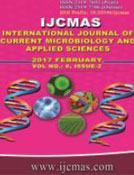


 National Academy of Agricultural Sciences (NAAS)
National Academy of Agricultural Sciences (NAAS)

|
PRINT ISSN : 2319-7692
Online ISSN : 2319-7706 Issues : 12 per year Publisher : Excellent Publishers Email : editorijcmas@gmail.com / submit@ijcmas.com Editor-in-chief: Dr.M.Prakash Index Copernicus ICV 2018: 95.39 NAAS RATING 2020: 5.38 |
The nosocomial infections are most important medical complications in all areas of the world and they remain one of the main sources of morbidity and mortality in hospitalized patients. Acinetobacter bacteria has appeared over the last era as significant opportunistic pathogen liable for nosocomial infections, although it is commonly related with benign colonization of hospitalized patients. The present investigation is carried out to isolate, identify Acinetobacter species from the different samples collected from tertiary care hospitals. Further susceptibility and resistance of different antibiotics against Acinetobacter is performed in the present study. A total of 30 samples from various sources (wound pus, urine, respiratory secretion, blood) were collected from hospital unit. Isolation is done for different samples by using different media as blood agar and MacConkey agar for pus samples, Chrom and CLED for urine samples, Blood agar, MacConkey agar and Chocolate agar for respiratory secretions and isolation from blood samples is done by using automated blood culture system. Acinetobacter isolates were initially identified according to the morphological characteristics on MacConkey agar and further identification is performed on the basis of biochemical characterization. The isolates of Acinetobacter are identified as Non-fermenter, Gram-negative coccobacilli on the basis of the Catalase positive, Oxidase negative, Urease negative, Nitratenegative, Indole negative and motility test. Antibacterial susceptibility testing was performed by Kirby Bauer disc diffusion method allowing to CLSI guidelines. Most of the isolates were obtained from blood samples. It has showed very high resistance (>75%) to Imipenem, Ceftazidime, Ciprofloxacin, Tobramycin, Doripenem. Only some of isolates have showed to be effective agents against gentamycin, amikacin and ampicillin sulbactam.
 |
 |
 |
 |
 |